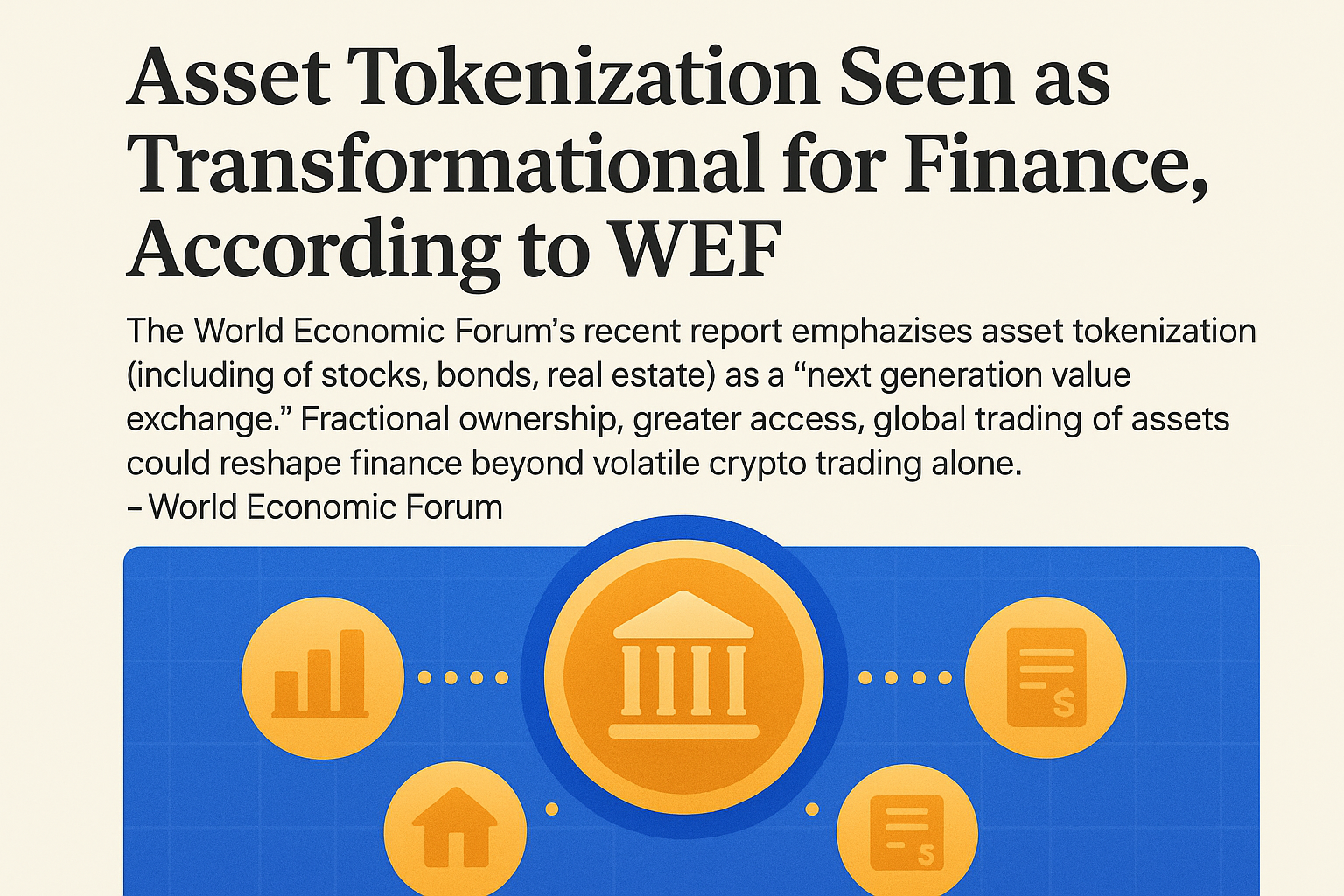The World Economic Forum (WEF) has released a new report that positions asset tokenization as one of the most transformative developments in modern finance. Going beyond the speculative volatility of cryptocurrencies, tokenization represents what the WEF calls a “next-generation value exchange” — one that could fundamentally change how assets are owned, traded, and accessed across global markets.
From Crypto Volatility to Real-World Value
For much of the last decade, blockchain technology has been associated primarily with cryptocurrencies like Bitcoin and Ethereum. While these digital currencies have dominated headlines, their volatility and limited use cases have often overshadowed the underlying innovation — the distributed ledger technology that makes blockchain possible.
The WEF’s latest report draws attention away from speculative trading and toward real-world applications. Tokenization, in this context, refers to the process of representing ownership rights of real-world assets — such as stocks, bonds, real estate, commodities, or even artwork — as digital tokens on a blockchain. These tokens can then be securely traded, transferred, or divided into smaller fractions, enabling fractional ownership.
Unlocking Access and Liquidity
One of the most promising aspects of tokenization is democratized access. Traditionally, investment in assets like commercial real estate or fine art has been reserved for institutional players or high-net-worth individuals. By converting these assets into tokens, they can be divided into smaller, more affordable units — effectively lowering the entry barrier for retail investors worldwide.
For example, instead of purchasing an entire building worth millions, an investor could buy a fraction represented by digital tokens, allowing them to share in the profits and appreciation without managing the property directly. This approach has the potential to make capital markets more inclusive while improving liquidity for otherwise illiquid assets.
A Global Marketplace of Tokenized Assets
The WEF report envisions a future where tokenized assets can be traded globally 24/7, much like cryptocurrencies today — but with the stability and backing of real, tangible value. This shift could transform how cross-border investments, collateral management, and financial settlements operate.
In such a world, an investor in Singapore could instantly buy fractional shares of a real estate development in Paris or a basket of green bonds issued in Canada. These transactions could be executed in real-time, with reduced fees and enhanced transparency thanks to blockchain’s immutable records.
Challenges on the Road Ahead
Despite the optimism, the WEF acknowledges several challenges that must be addressed before tokenization becomes mainstream. Regulatory clarity remains one of the biggest obstacles. Different jurisdictions have varied definitions and rules for digital assets, creating uncertainty for global investors and platforms.
Additionally, issues related to valuation, custody, interoperability, and investor protection must be resolved to ensure tokenized assets can integrate seamlessly into existing financial systems. Without these safeguards, large-scale institutional adoption will remain limited.
Beyond Finance: The Broader Impact
While the financial sector is likely to be the first to fully embrace tokenization, the implications extend much further. The same principles could be applied to intellectual property, carbon credits, supply chains, and even identity verification. In essence, any asset with provable ownership could be tokenized, verified, and exchanged digitally — potentially creating an entirely new digital economy built on transparency and efficiency.
The Next Evolution of Finance
As the WEF highlights, the significance of asset tokenization lies not in the technology itself, but in how it reshapes trust and access in the global economy. Just as the internet transformed information sharing, blockchain-based tokenization could transform how value is exchanged — moving finance into a more open, borderless, and inclusive era.
While we’re still in the early stages of this transformation, the momentum is unmistakable. As regulations evolve and infrastructure matures, tokenization could become the defining innovation of the next decade in global finance, connecting traditional assets with the digital world and making ownership more universal than ever before.




